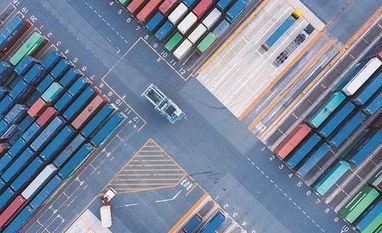)
What is National Logistics Policy?
Prime Minister Narendra Modi on September 17 launched the National Logistics Policy, (NLP) in New Delhi. The project aims to promote seamless movement of goods across the country, while also improving the competitiveness of Indian goods in both domestic and global markets. It also aims to enhance economic growth and increase employment opportunities.
Why do we need a logistics policy? The need for a national policy was felt since the logistics cost in India is higher when compared to other developed economies in the world. Reduction in the logistics cost improves efficiency cutting across various sectors of the economy, while encouraging value addition and enterprise. National Logistics Policy is a comprehensive effort to address the issue of high cost and inefficiency by laying down an interdisciplinary, cross-sectoral and multi-jurisdictional framework for the development of the entire logistics ecosystem. As of now, India spends nearly 13 to 14 per cent of its Gross Domestic Product on logistics cost, while countries like Japan and Germany only spend 8-9 per cent of its GDP on the cost. During the launch of the policy, Prime Minister Narendra Modi said that the policy is a culmination of hard work of over eight years and India should try to bring down the logistics cost per cent to single-digit as soon as possible. According to the 2018 World Bank Logistics Index, India is ranked 44th in the logistics cost. India is behind developed countries like the US and China, which were ranked at 14th and 26th position respectively. Targets under the policy National Logistics Policy will aim to prevent wastage of agro-products while also enabling quick last-mile delivery. The government will also create a Unified Logistics Interface Platform (ULIP) under NLP, which will integrate seven ministries on one platform to provide logistics companies with information about cargo movement in the country. The government will also integrate 17 digital platforms from the seven ministries on ULIP. ULIP will provide logistics companies, importers, and exporters data on their cargo movement across the country and will also help provide cargo movement clearances.
Why do we need a logistics policy? The need for a national policy was felt since the logistics cost in India is higher when compared to other developed economies in the world. Reduction in the logistics cost improves efficiency cutting across various sectors of the economy, while encouraging value addition and enterprise. National Logistics Policy is a comprehensive effort to address the issue of high cost and inefficiency by laying down an interdisciplinary, cross-sectoral and multi-jurisdictional framework for the development of the entire logistics ecosystem. As of now, India spends nearly 13 to 14 per cent of its Gross Domestic Product on logistics cost, while countries like Japan and Germany only spend 8-9 per cent of its GDP on the cost. During the launch of the policy, Prime Minister Narendra Modi said that the policy is a culmination of hard work of over eight years and India should try to bring down the logistics cost per cent to single-digit as soon as possible. According to the 2018 World Bank Logistics Index, India is ranked 44th in the logistics cost. India is behind developed countries like the US and China, which were ranked at 14th and 26th position respectively. Targets under the policy National Logistics Policy will aim to prevent wastage of agro-products while also enabling quick last-mile delivery. The government will also create a Unified Logistics Interface Platform (ULIP) under NLP, which will integrate seven ministries on one platform to provide logistics companies with information about cargo movement in the country. The government will also integrate 17 digital platforms from the seven ministries on ULIP. ULIP will provide logistics companies, importers, and exporters data on their cargo movement across the country and will also help provide cargo movement clearances.
Latest Updates on National Logistics Policy
As many as 13 firms, including MapMyIndia, CargoExchange and Yes Bank, have signed a non-disclosure agreement with the government to access data from the Unified Logistics Interface Platform